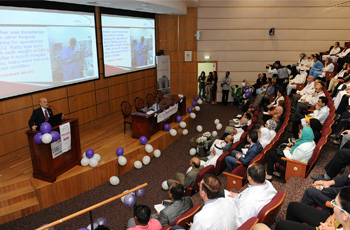 University Hospital Sharjah (UHS) marked World Prematurity Day on November 18 with various programs to create awareness about babies that are born early and ease concerns of their families.
University Hospital Sharjah (UHS) marked World Prematurity Day on November 18 with various programs to create awareness about babies that are born early and ease concerns of their families.
UHS, a premier hospital and a leading referral center, brought parents and specialists together to make couples aware of the special care and needs of preterm babies. About 100 premature babies, their parents and relatives attended this awareness day. UHS recorded total number of births to 780 from January 2015 till date out of which 123 were premature babies.
A baby born less than 37 weeks of gestation is termed as a premature baby (preemie) and is in danger of suffering from complications after birth and faces a lifetime of disability. Prematurity is the most common cause of deaths worldwide and the World Health Organization (WHO) reports that one million babies die due to complications of being born early.
HE Abdulla Ali Al Mahyan, Chairman Sharjah Health Authority and Chairman of Board of Trustees, UHS, said; “Preterm birth is a growing problem and these babies’ lives can be saved and its negative effects on families can easily be prevented by effective interventions. Our responsibility, under the leadership and continuous support of His Highness Sheikh Dr Sultan bin Muhammad Al Qasimi, Supreme Council Member and Ruler of Sharjah, and as part of the medical community, is to make sure that those solutions are provided in every possible way.”
World Prematurity Day is marked on November 17, however, UHS is marking it a day later to also celebrate the good survival rate of babies born before full term, at the Hospital.
Prof. Hakam Yaseen, Consultant of Neonatology and Paediatrics at UHS said; “The survival rate achieved is 996 babies for every 1000 deliveries, this is equivalent to international standards such as in Europe and the US.”
WHO has warned that 15 million babies are born premature yearly, which is one in every 10 births worldwide. While there are no statistics available for the UAE, prematurity is a major problem for the health sector as more couples opting for IVF (in vitro fertilization) because of fertility issues, are also having babies born early.
Due to the growing number of premature babies UHS will add eight more beds to its NICU, providing 19 intensive care unit beds very soon. About 10 percent of all deliveries in the UAE are premature, according to Prof Hakam.
If a baby is born much early, it is not only smaller but suffers from various complications and has very low immunity. A premature baby needs to be placed in an incubator as it cannot survive on its own. The incubator helps the baby breathe and offers a sterile environment.
Women with a malformation of the uterus cannot avoid a premature birth, but those suffering from diabetes and hypertension can deliver a full-term baby if these diseases are brought under control.
Gestating women are advised to follow diligently the instructions given by the obstetrician-gynaecologist and get regular check-ups done.
There are various factors that cause early delivery such as the mother suffering from diabetes, high Blood Pressure (BP), obesity and stress. Smoking is a big risk factor and doctors warn against smoking the shisha before and during pregnancy.

